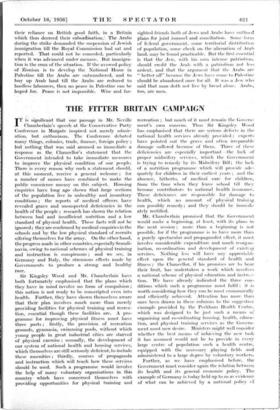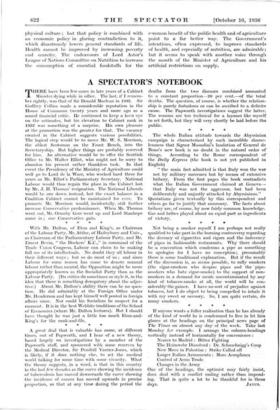THE FITTER BRITAIN CAMPAIGN
It is significant that One passage in Mr. Neville of the population live in unhealthy and insanitary , conditions ; the reports of medical officers have revealed graN-e and unsuspected deficiencies in the health of the people ; research has shown the relation between bad and insufficient nutrition and a low standard of physical health. These facts will not be ignored; they are confirmed by medical enquiries in the schools and by the low physical standard of recruits offering themselves for the army. On the other hand, the progress made in other countries, especially Scandi- navia, owing to national schemes of physical training and instruction is conspicuous ; and we see, in Germany and Italy, the strenuous ,effects made by Governments to produce a strong and healthy race, .
Sir Kingsley Wood and Mr. Chamberlain have both fortunately emphasised that the plans which they have in mind involve no form of compulsion ; this nation is not ready to be conscripted even into health. Further, they have shown themselves aware that their plan involves much more than merely providing facilities for physical training and recrea- tion, essential though these facilities are. A pro- gramme for improving physical fitness must have three parts ; firstly, the provision Of recreation grounds, gymnasia, swimming pools, without which young people in great industrial cities are starved of physical exercise ; secondly, the development of our system of national health and housing services, 'which themselves are still seriously deficient, to include these amenities ; thirdly, courses of propaganda and instruction which will teach how these services should be used. Such a programme would involve the help of many voluntary organisations in this country which have concerned themselves with providing opportunities for physical training and . .
recreation ; but much of it must remain the Govern- ment's: own concern. Thus Sir Kingsley Wood has emphasised that there are serious defects in the national health services alrendy'- provided ; experts have 'pointed out the grave and often irreparable damage suffered . because' of them. Three of these deficiencies are especially important—the lack of proper midwifery services, which the Government is trying to remedy by its Midwifery Bill; the lack of a nutrition programme which will provide ade- quately for children in their earliest years ; and the absence, hitherto, of medical care for children, from the time when they leave school till they become contributors to . national health insurance. These deficiences are responsible for damage. to health, which no amount of phYsi&d training can possibly remedy; and they should be immedi- ately rectified.
Mr. Chamberlain promised that the Government would make a beginning, at least, with its plans in the next session ; more than a beginning is not possible, for if the programme is to have more than a purely spectacular and propagandist effect, it must involve considerable expenditure and much reorgan- isation, co-ordination and development of existing services. Nothing less will have any appreciable effect upon the general standard of health and fitness ; the Chancellor, if his promises are to bear their fruit, has undertaken a work which involves a national scheme of physical education and instru,!:- tion. We have already indicated the three con- ditions which such a programme must fulfil ; it is worth considering how they can be most economically and efficiently achieved. Attention has more than once been drawn in these columns to the suggestive example provided by the Peckham Health Centre, which was designed to be just such a means oi.' organising and co-ordinating housing, health, educa- tion, and physical training services as the . Govern- , ment must now desire. Ministers might well consider whether the best means of achieving. the new task it has assumed would not be to, provide in every large centre of population such a health centre, equipped. with the necessary .playing fields and administered to a large degree by voluntary workers.
Further, as we have emphasised before, the Government must consider again the relation between its health and its general economic policy. The example of Germany is today held up thus as evidence of what can be achieved by a national policy cf physical culture ; but that policy is combined with an economic policy in glaring contradiction to it, which disastrously lowers general standards of life. Health cannot be improved by increasing poverty and scarcity. The endeavours of Lord Astor's League of Nations Committee on Nutrition to increase the consumption of essential foodstuffs for the common benefit of the public health and of agriculture point to r far better way. The Government's intentions, often expressed, to improve standards of health, and especially of nutrition, are admirable; but it seems to speak with another voice through the mouth of the Minister of Agriculture and his artificial restrictions on supply.





















































 Previous page
Previous page